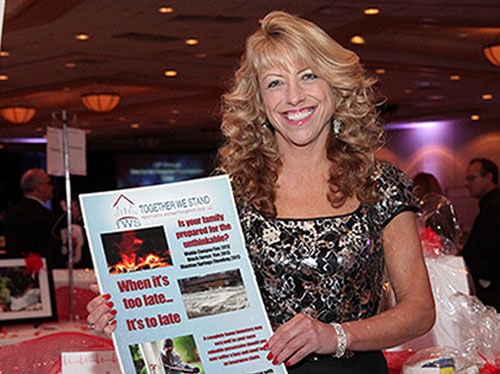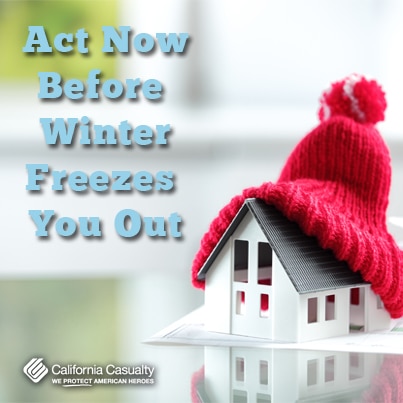by California Casualty | Auto Insurance Info, Homeowners Insurance Info |

As we drop the confetti and toast the New Year, an annual tradition is to make a resolution. What will yours be? Here are the top five resolutions Americans have made in recent years:
- Lose weight
- Get organized
- Spend less and save more
- Enjoy life
- Become more fit and healthy
Unfortunately, research shows less than 10 percent of those of us who make resolutions actually keep them.
But, there are easy actions you can take that could save you money and provide peace of mind.
Every year, many Americans fail to take stock of their biggest assets: their homes and vehicles. Here is a list of 11 simple resolutions you can make this New Year to protect the most valuable possessions you have worked so hard to attain.
7 Home Insurance Resolutions:
- Do a yearly policy review with an insurance advisor to check that you are getting all the discounts you qualify for, that you adequately insure any new additions or appliances, and verify that your liability coverage isn’t lacking
- Make sure you have replacement value if a fire or other disaster strikes
- Purchase earthquake or flood insurance if you live in areas prone to either
- Save on your premiums by investing in security and fire suppression systems
- Get renters insurance if you don’t have it yet
- Protect high-dollar items such as jewelry, fine art or musical instruments with scheduled personal property insurance
- Complete a comprehensive inventory of everything in your home in case you should ever have a claim
4 Auto Insurance Resolutions:
- Get a yearly policy review to check deductibles, coverages and to make sure you are getting all the discounts you qualify for (professional, multi-policy, good student, mature driver)
- Make certain you have adequate protection from uninsured or under-insured drivers
- Add any new drivers to your policy (teens or a new spouse)
- Bundle your auto and home insurance to receive deeper discounts
We Are Here To Help
Start the New Year off right; resolve to call today to make sure you are getting the professional discounts you deserve: $500 coverage for items destroyed or stolen from your vehicle, deductible waived or reduced if your vehicle is vandalized or hit while parked where you work, and special coverages for the equipment used for your job.
California Casualty advisors are ready to help you with any questions, do a policy comparison or review, or make any insurance changes you may need at 1.800.800.9410, or go online at www.calcas.com.
Resources for this article:
https://www.statisticbrain.com/new-years-resolution-statistics/
https://www.insurancejournal.com/news/national/2014/08/12/337407.htm
https://www.knowyourstuff.org/iii/login.html
by California Casualty | Homeowners Insurance Info |
By Carrie Mitchell, Owner & Founder

TWS Home Inventory
Knowing the despair that follows a major loss, Carrie Mitchell founded TWS Home Inventory in 2012 after helping victims of the devastation caused by Colorado’s Waldo Canyon fire in. It was in the aftermath that Carrie realized how much heartache and stress could be avoided with a professionally detailed home inventory. TWS Home Inventory is now available in California and the East Coast.
Carrie and TWS Home Inventory have been featured in Colorado media, FOX News National, FOX News Business, the Insurance Journal and the Huffington Post. Carrie will be providing us with important content about the need for a home inventory and the many ways not having one could hurt you.
California Casualty proudly insures a sector of society that knows all too well the importance of being proactive instead of reactive in our everyday lives. As educators, health care providers, fire fighters, first responders, and peace officers you see the devastating aftermath of situations outside of our control.
TWS Home Inventory and Asset Management Group was founded in 2012 as a direct result of the plight of affected homeowners in the aftermath of Colorado’s Waldo Canyon Fire. As a homeowner personally affected by this natural disaster that devastated the Colorado Springs area in 2012, I saw first-hand the trail of destruction left behind: over 350 homes destroyed and countless numbers severely damaged, 18,247 acres of forest blackened, firefighting costs alone were over $15 million, home losses and insurance claims were estimated at over $356 million two years after the fire, and many claims remain in dispute even after three years.
Although most homes were insured, the financial recovery for contents was much less than the insured structure amount and for valuables such as jewelry, guns, paintings, family heirlooms and antiques. Many of these precious possessions were simply lost forever. The simple reason for this fact is that most homeowners had no physical record or documentation of their valued possessions, let alone were even able to remember a fraction of the items lost. Now, three years later, many homeowners are still struggling to itemize their possessions leaving them with a feeling of being victimized a second time.
As a volunteer assisting these homeowners, the idea for a professionally documented home inventory service was born and TWS Home Inventory and Asset Management Group was formed. In 2013, the Black Forest Wildfire brought even greater devastation to the Colorado Springs area with over 511 homes destroyed and it was followed by the Waldo Canyon Flood.
The Root of the Problem
Once insured, a homeowner assumes that everything is covered and is totally unaware of the serious need for a documented inventory, much less the value that it adds to their insurance coverage. In my experience, most homeowners never read their policy to see what actually is and is not covered until they are in the claims process. Any loss, partial or total, requires some form of proof of ownership of contents, especially when it comes to specific valuable articles. Working with victims of loss, one thing seems to always be evident; homeowners tend to want to blame the insurance company for insufficient compensation. Unfortunately, few realize until after the fact that it is the homeowner’s responsibility prior to that loss to inform the insurance carrier of what they own to ensure proper coverage.
In the coming months we look forward to sharing with you the invaluable information learned over the past three years from homeowners affected by some of the worst natural disasters in recent years. Our goal in this series is to help educate proactive policyholders on the specific personal items you may own which need to have appraisals, floaters, riders, and endorsements not covered in a typical homeowner’s policy, because
When it’s too late….It’s too late!
You can learn more about Carrie Mitchell and free home inspection resources at
www.twshomeinventory.com.
by California Casualty | Homeowners Insurance Info |

There’s no better feeling than finally get your holiday gift buying done. It’s such a sense of accomplishment and you can’t wait to see the beaming faces of friends and loved ones opening their special presents. However, if you’re not careful you might also be is advertising that bounty to crooks and thieves who are looking to take it from you.
Nothing steals the joy of the season like a holiday home burglary. Unfortunately, the FBI warns that they increase during the holidays with nearly 400,000 break-ins occurring during November and December. Most of those are crimes of opportunity from criminals looking for an easy target.
Here are things you can do to reduce your risk of being a victim:
Make your home less vulnerable
- Trim back bushes or hedges that block visibility and give thieves areas to hide
- Install outdoor lighting (motion sensitive are best)
- Put indoor lights on timers
- Have a security system installed
- Get a dog (crooks say a barking dog is a huge deterrent)
- Keep garage doors closed
- Always lock doors and windows
- Keep watch of your neighbors’ homes and ask they do the same for you
Don’t advertise to criminals
- Stop mail and newspaper deliveries if you are going away
- Arrange for your neighbors to accept any home deliveries when you are not home
- Don’t leave garbage cans out while you are away
- Never leave notes on doors telling someone you are out and when you will return
- Do leave a radio or TV on while you are away
- Have a trusted friend, neighbor or relative make trips to your home or park a car in the driveway to make it look lived in while you are away
- Conceal valuables and don’t leave Christmas trees and presents visible from the outside
- Break down and conceal boxes for expensive items and electronics when putting out the trash (boxes for the new 60” HD TV or the latest computer are like shopping flyers for thieves)
- Don’t advertise on social media that you are going away to grandma’s house or on a wonderful vacation (this also applies to your children)
Protect yourself
- Make a complete home inventory of your possessions to assist if you need to file a police report, help speed up an insurance claim and help with a tax-loss write off
- Be sure to have an identity theft protection and recovery service if burglars get access to your personal or banking information
- Protect your possessions with homeowners or renters insurance
Not only do you feel violated after someone breaks into your home, but it can be expensive to fix the damage and replace items. That’s why you need homeowners and renters insurance. We can’t stop all criminals, but California Casualty is here to protect you with quality auto and home insurance with exclusive benefits not available to the general public. Every policy also comes with free ID theft protection. Call an advisor today for a policy comparison or review at 1.800.800.9410, or visit www.calcas.com.
Sources for this article:
https://www.crimepreventiontips.org/home-safety
https://www.mariettaga.gov/city/police/getinvolved/burglary-prevention
https://www.iii.org/press-release/vacation-bound-use-these-five-prevention-tips-to-protect-your-home-against-burglars-while-youre-away-070312
https://www.lapdonline.org/crime_prevention/content_basic_view/1376
https://www.supercircuits.com/resources/blog/burglary-prevention-tips-for-the-holidays
by California Casualty | Homeowners Insurance Info |

Fall is my favorite time of year; the air turns crisp and cool, the leaves change brilliant colors and it’s a nice breather before winter sends its icy grip. As the days grow shorter and the leaves fall, it’s the perfect time to look around your home and get prepared for winter. Fall’s mild temperatures and adequate daylight provides an opportunity to check the heater, repair gutters and add extra insulation to the attic. An early autumn storm or blizzard is no time to learn you have leaks or other problems.
The Insurance Information Institute estimates that winter-related damage causes over a billion dollars in insurance losses annually. Prevent your home from being a statistic; use this checklist to make sure it’s ready for the onslaught of winter:
- Have your heating system checked and cleaned
- Inspect ceilings, windows and outer walls for cracks
- Change air filters
- Check your pipes and plumbing
- Inspect your roof for wear or damage and clean the gutters
- Install weather stripping and caulk around windows and doors
- Seal up foundation and driveway cracks
- Check your fireplace and chimney for cracks or leaks
Look around your deck or patio and yard; now is the time to clean and store seasonal outdoor furniture and flower pots, drain sprinkler systems, trim trees and shrubs, fertilize lawns and mulch gardens. Don’t forget to service the snow blower and lawn mower while you are at it.
You also need to make sure your home is fire safe and you check your smoke and carbon monoxide detectors; the National Fire Protection Association warns that home fires and carbon monoxide poisonings climb during the fall and winter months. They recommend:
- Installing smoke alarms in every bedroom, outside each separate sleeping area and on all levels of the home
- Installing carbon monoxide detectors in a central location outside each sleeping area and on all levels of the home
- Testing all smoke and carbon monoxide detectors and replacing the batteries once a year (fall is the preferred time)
- Having heating equipment and chimneys cleaned and inspected every year by a qualified professional
- Keeping any flammable material at least three feet from heat sources
- Checking fire extinguishers
- Knowing and practicing home escape routes
A vital preparation for any season is to review and understand your homeowners or renters insurance policy. Contact a California Casualty advisor today for a free, no hassle insurance policy review and comparison at 1.800.800.9410. You may also find you qualify for significant discounts and better coverage.
And, don’t forget your cars and trucks. For tips to make sure your vehicle is prepared for winter please visit https://mycalcas.com/2012/11/preparing-your-car-for-winter/.
Sources for this article:
https://www.resnet.us/library/preparing-your-home-for-fall/
https://www.nfpa.org/safety-information/safety-tip-sheets
https://www.iii.org/fact-statistic/winter-storms
https://www.naic.org/documents/consumer_guide_home_booklet.pdf
by California Casualty | Homeowners Insurance Info |

We all love the wonderful aroma of baking pies and roasting turkeys; however, preparing the Thanksgiving meal can be a dangerous time. The National Fire Protection Association is reminding everyone to be especially careful because Thanksgiving is the number one day for home cooking fires in the United States, followed by Christmas Day and Christmas Eve.
Unattended cooking was the leading factor in these fires, and cooking equipment was the leading cause of home fires that caused burns and injuries.
So as you begin preparing that mouth-watering meal for your friends and loved ones, here are some simple tips to keep everyone safe and the holiday meal a success:
- Always stay in the kitchen when you are cooking on the stovetop to keep an eye on the food
- Don’t leave home while cooking your turkey and check it frequently
- Remove any loose fitting clothing or dangling sleeves
- Make sure plastic bags, paper towels, oven mitts and other combustibles are away from open flames and heat sources
- Keep children at least three feet away from stoves
- Make sure kids stay away from hot food and liquids that can cause serious burns
- Keep floors clear and clean so you don’t slip or trip
- Keep knives out of the reach of children
- Never leave children alone with or in reach of candles, lighters or matches
- Have a fire extinguisher available
- Make sure that your smoke alarms are working properly
One of the more dangerous turkey cooking methods is deep fat frying; while it can provide a super succulent bird, fire agencies warn it can cause burns and eruptive fires. In fact, UL testing labs does not certify any home deep fat fryers. If you decide to use this method, the Butterball Turkey Hotline has very specific instructions to reduce the risk of fire or injury.
Also, on this holiday, don’t forget to thank our emergency personnel: firefighters, law enforcement officers and nurses who will be working, offering protection and comfort. California Casualty wishes everyone a very happy Thanksgiving. We are here to protect your auto and home from fire and other dangers with insurance specifically tailored for law enforcement officers, firefighters, nurses and educators. Learn more at www.calcas.com or call one of our advisors at 1.800.800.9410.
Sources for this article:
https://www.nfpa.org/safety-information/for-consumers/seasonal/thanksgiving-safety
https://www.redcross.org/news/article/Cooking-Safety-Tips-for-Thanksgiving-Chefs
https://www.butterball.com/how-tos/deep-fry-a-turkey
https://www.nachi.org/deep-fryer-inspection.htm
https://www.youtube.com/watch?v=yObDuYTfudY
by California Casualty | Homeowners Insurance Info |

by: Mark Goldberg
As more and more of us opt to rent rather than own a home, the monthly cost has been climbing. My wife and I are experiencing it as we start looking for a place for our daughter when she moves out of the dorm next year. There’s nothing worse than thinking you have found the perfect place and then realizing you really can’t afford it. Here are some things to take into consideration for your calculations.
First, how much rent can you really afford? Let’s face it; it’s really expensive these days to rent a place. A new Harvard study found many of us are now paying 50 percent of our income on rent. However, The U.S. Census Bureau and many financial experts say we should only pay 20 to 30 percent of our monthly take home pay. So, if you bring home $4,000 a month, you should consider monthly rents around $1,200. Every dollar more means less you will have for going out to dinners, concerts or saving for a home.
Second, calculate the expense of finding that place. Many first time renters fail to consider application fees many landlords now charge, the security deposit (often a month’s rent) and having to come up with first and last month’s rent. This can add up to a many thousands of dollars before you even get the chance to move into your new apartment or house.
Third, don’t forget to use your “scam radar.” As apartment and home rentals become scarce and more expensive, scammers are working to lure desperate people. The Federal Trade Commission is warning about a growing proliferation of criminals running fake rental ads or hijacking landlord advertising accounts trying to steal money from vulnerable consumers. Many people fail to confirm what they are renting and who they might be renting from, as evidenced by a New York bar owner who ran a fake ad about a one bedroom for rent that turned out to be his public restroom. He was shocked at the number of people who responded. With that in mind, here are the top signs that apartment or home rental ad could be fake:
- It seems too good to be true
- There is no address
- The contact is only by email or mail
- The landlord seems too eager to rent and doesn’t ask for your employment verification or any other tenant screening
- You are asked to wire money to apply or hold the apartment (especially if you never met anyone in person)
- You’re told you don’t need a lease or rental agreement
- The “landlord” says she is out of town and will only come back to meet you if you send money first
Finally, think about your other expenses. After you pay rent, will you have enough for utilities, cell phone, cable, internet, food, fuel, car payment and fun? Don’t forget about any student loans you have to repay. If you overdo what you pay for rent you may not have enough money for your other financial obligations, not to mention not being able to afford going out to see a movie or joining friends for dinner. Use this rent affordability calculator to gage what your budget allows.
Here are ways to reduce your monthly costs:
- Look outside the urban area like a nearby town or suburb for rentals
- Get a roommate or roommates
- Apply for rental subsidies offered by some cities and the federal government
- Scale down your expectations and find a smaller apartment
- Negotiate with the landlord
- Do without cable or satellite TV
- Have more meals at home with friends rather than going to restaurants
One expense you should never skimp on is renters insurance. Your landlord’s insurance doesn’t cover your things, and many landlords now require you to have our own policy. For as little as $15 a month you can protect your possessions from fire, theft or damage from a broken water pipe. Renters insurance also covers you in case someone gets hurt at your place and sues. Make sure you have the coverage you need, contact a California Casualty advisor for a quote today at 1.800.800.9410 or visit www.calcas.com.
Sources for this article:
https://www.census.gov/housing/census/publications/who-can-afford.pdf
https://www.jchs.harvard.edu/us-rental-housing-crisis-projected-grow-households-paying-more-50-percent-income-rent-topping-13
https://www.dailyfinance.com/2015/06/29/save-money-renting-apartment/
https://www.moneycrashers.com/how-to-find-cheap-apartments-for-rent-guide/
https://blog.credit.com/2015/06/how-much-rent-can-i-afford-119742/
https://mmink.com/calcs/renter1.html
https://www.moneycrashers.com/monthly-rent-afford-calculator/
https://www.gobankingrates.com/personal-finance/surprise-savings-account-wont-cover-cost-renting-apartment/
https://apartments.about.com/od/apartmenthunting/a/How-To-Recognize-And-Avoid-Apartment-Rental-Scams.htm
https://www.consumer.ftc.gov/articles/0079-rental-listing-scams
https://www.amny.com/real-estate/nyc-bathroom-advertised-as-hip-artist-loft-shows-how-desperate-people-are-to-live-in-city-1.10952017
https://portal.hud.gov/hudportal/HUD?src=/topics/rental_assistance






